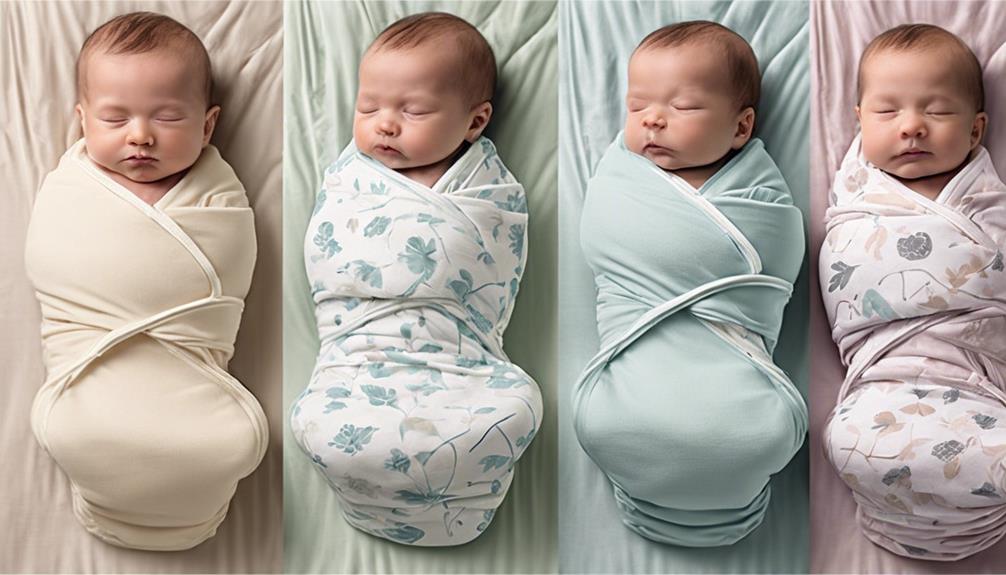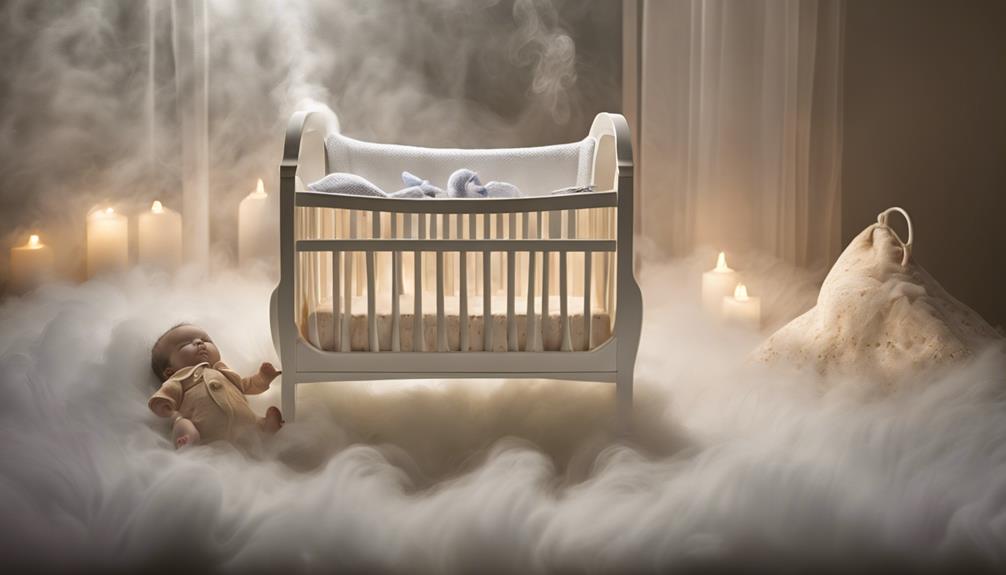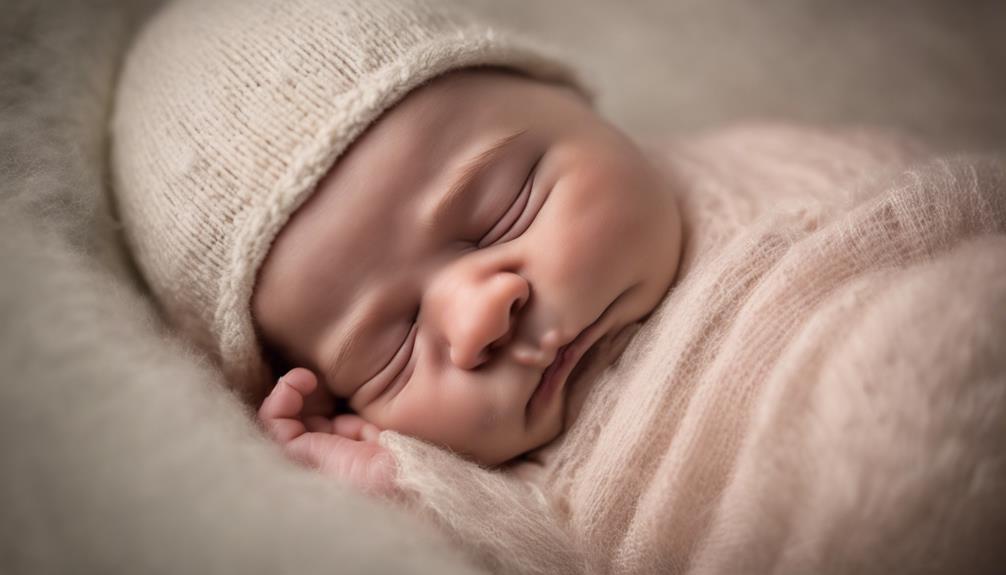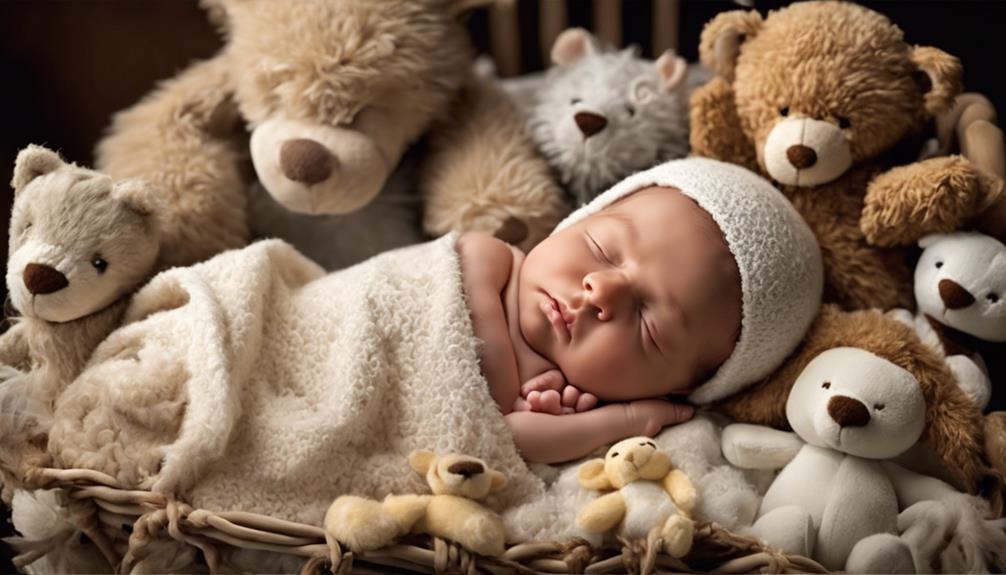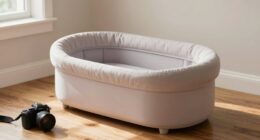When delving into the intricate web of causes behind newborn sleep apnea, it's akin to unraveling a complex puzzle. The factors contributing to this condition are multifaceted, ranging from central apnea linked to respiratory center depression to obstructive apnea caused by airway blockages.
However, as we peel back the layers, there is a pivotal piece missing that ties everything together, a piece that holds the key to understanding the root of this phenomenon. Let's explore further into the depths of what truly lies at the core of newborn sleep apnea.
Key Takeaways
- Genetic mutations and family history increase susceptibility.
- Premature birth leads to underdeveloped respiratory centers.
- Neurological conditions disrupt brain signaling for breathing.
- Secondhand smoke and poor air quality exacerbate symptoms.

Owlet Dream Sock® – FDA-Cleared Smart Baby Monitor – Track Live Pulse (Heart) Rate, Oxygen in Infants – Receive Notifications – Mint
FDA-Cleared Wearable Baby Monitor: Dream Sock is the first FDA-cleared smart baby monitor providing real-time pulse rate and…
As an affiliate, we earn on qualifying purchases.
As an affiliate, we earn on qualifying purchases.
Risk Factors for Newborn Sleep Apnea
Exposure to various risk factors greatly heightens the vulnerability of newborns to developing sleep apnea. Conditions such as low birth weight, premature birth, and small airways pose challenges to newborns, making them more prone to breathing difficulties during sleep. Additionally, issues like reflux and neuromuscular disorders can further increase the risk of sleep apnea in these infants. Secondhand smoke exposure is a significant concern as it can exacerbate breathing problems and contribute to the development of sleep apnea in newborns. Craniofacial abnormalities, including cleft palate and larynx issues, also play a role in raising the likelihood of obstructive sleep apnea in this population.
Moreover, newborns with Down syndrome, cerebral palsy, or other neuromuscular disorders face an increased risk of developing sleep apnea due to underlying physiological factors. Hence, it's important for caregivers and healthcare providers to be aware of these risk factors and take necessary precautions to provide a safe and supportive sleep environment for vulnerable infants.

Babysense 7 Baby Sleep Breathing Movement Monitor for Newborn and Infants, No WiFi, Non Wearable, Non Contact Monitor with 2 Under-Mattress Sensors for Full Crib Coverage, FSA Baby Monitor
HSA/FSA APPROVED – Babysense is a highly sensitive device that monitors and detects even the slightest baby's movements…
As an affiliate, we earn on qualifying purchases.
As an affiliate, we earn on qualifying purchases.
Genetic Influences on Newborn Sleep Apnea

Genetic influences play a significant role in the development of newborn sleep apnea, impacting respiratory control and breathing patterns during sleep. When considering genetic factors in newborn sleep apnea, several key points emerge:
- Certain gene mutations can contribute to the susceptibility of newborns to sleep apnea.
- Research indicates a genetic predisposition to sleep-disordered breathing in infants, affecting their respiratory control mechanisms.
- Variations in genes associated with respiratory centers and airway structure may elevate the risk of newborn sleep apnea.
A family history of sleep apnea or related disorders can increase the likelihood of newborns experiencing sleep-related breathing issues. Understanding the genetic influences on newborn sleep apnea is important for early identification and implementing targeted interventions to manage this condition effectively. By recognizing these genetic predispositions, healthcare providers can tailor treatment strategies to address the specific needs of infants affected by sleep apnea from a genetic standpoint.

GROWNSY Nasal Aspirator for Baby, Electric Baby Nose Sucker with Larger Suction Chamber and More Powerful Suction, Automatic Nose Cleaner with Music and Light Soothing Function
EFFORTLESS CLEARANCE: GROWNSY's Top-Rated Electric Nasal Aspirator for Babies features 3 adjustable suction levels for customized comfort, features…
As an affiliate, we earn on qualifying purchases.
As an affiliate, we earn on qualifying purchases.
Impact of Premature Birth on Sleep Apnea

Premature birth greatly heightens the susceptibility of newborns to sleep apnea, particularly in those with low birth weight. Infants born prematurely often have underdeveloped respiratory centers, which can lead to breathing difficulties during sleep. These underdeveloped respiratory centers make them more prone to experiencing apnea episodes, especially since premature infants spend more time in REM sleep where these events are more likely to occur.
In fact, the incidence of sleep apnea in newborns weighing under 2.2 pounds can be as high as 84% within the first month of life. Additionally, medical conditions that are commonly associated with premature birth can further contribute to or worsen sleep apnea in newborns. The combination of prematurity, low birth weight, underdeveloped respiratory centers, increased REM sleep, and other medical complications greatly elevates the risk of sleep apnea in newborns born prematurely.

Cococu Baby Head Pillow for Newborn, Soft Infant Head Support with Organic Cotton Cover, Breathable Ergonomic Baby Neck Support for Car Seat, Stroller & Bassinet, White
Soft & Comfortable: Ultra-soft, breathable fabric with gentle padding provides cozy baby head and neck support for everyday…
As an affiliate, we earn on qualifying purchases.
As an affiliate, we earn on qualifying purchases.
Neurological Conditions and Sleep Apnea in Newborns

Neurological conditions can greatly influence the occurrence of sleep apnea in newborns, particularly through disruptions in brain signaling that control breathing patterns. These conditions include brain immaturity, seizures, and brainstem abnormalities.
Additionally, cerebral palsy, genetic disorders impacting the brain, and other neurologic insults can elevate the risk of sleep apnea in newborns. Abnormal brain signals responsible for regulating breathing can lead to central sleep apnea in these infants.
Furthermore, neurological issues may interfere with the coordination between the brain and respiratory muscles, resulting in pauses in breathing during sleep. It's imperative to identify and address underlying neurological conditions promptly to effectively manage and treat sleep apnea in newborns.
Environmental Triggers of Newborn Sleep Apnea

Exposure to secondhand smoke stands out as a significant environmental trigger for sleep apnea in newborns. The toxins and pollutants present in secondhand smoke can irritate a baby's delicate respiratory system, leading to disruptions in breathing patterns during sleep.
Additionally, allergens like dust mites or pet dander in the environment may worsen symptoms of sleep apnea in infants. Poor indoor air quality, often due to mold or mildew, can also play a role in triggering sleep apnea episodes in newborns.
Moreover, overheating or inadequate ventilation in the sleeping area can exacerbate the condition by making it harder for the baby to breathe comfortably. It's essential for caregivers to create a clean and well-ventilated sleep environment for infants to reduce the risk of environmental factors contributing to sleep apnea.
Prioritizing a safe and healthy sleeping space can help mitigate the impact of these triggers on newborns' respiratory health.
Frequently Asked Questions
What Causes Sleep Apnea in Infants?
We explore the causes of sleep apnea in infants. Factors such as brain immaturity, heart issues, acid reflux, infections, genetics, structural problems, prematurity, maternal smoking, and neurologic insults can all contribute. Identifying these triggers is important for effective treatment.
Does Newborn Apnea Go Away?
Yes, newborn apnea often resolves on its own as the baby's respiratory system matures. Supportive care and monitoring play important roles. If severe or persistent, treatment may be needed. Most cases improve with time.
How Common Is Apnea in Newborns?
Apnea in newborns is more prevalent in premature infants, especially those under 2.2 pounds, with an incidence of 84% within the first month. It's rare in full-term babies. Medical conditions can exacerbate this condition, posing risks.
Is Sleep Apnea a Sids?
Sleep apnea, a condition involving breathing interruptions, is not SIDS, which is linked to unexplained infant deaths during sleep. Proper diagnosis and management for sleep apnea can help minimize risks associated with SIDS.
Conclusion
To summarize, newborn sleep apnea can stem from various factors such as central apnea, obstructive apnea, and mixed apnea. Understanding the underlying causes, including genetic influences, premature birth, neurological conditions, and environmental triggers, is essential for proper diagnosis and treatment.
Like a detective unraveling a mystery, healthcare professionals must carefully assess these risk factors to provide effective management and prevent long-term health complications in newborns.


